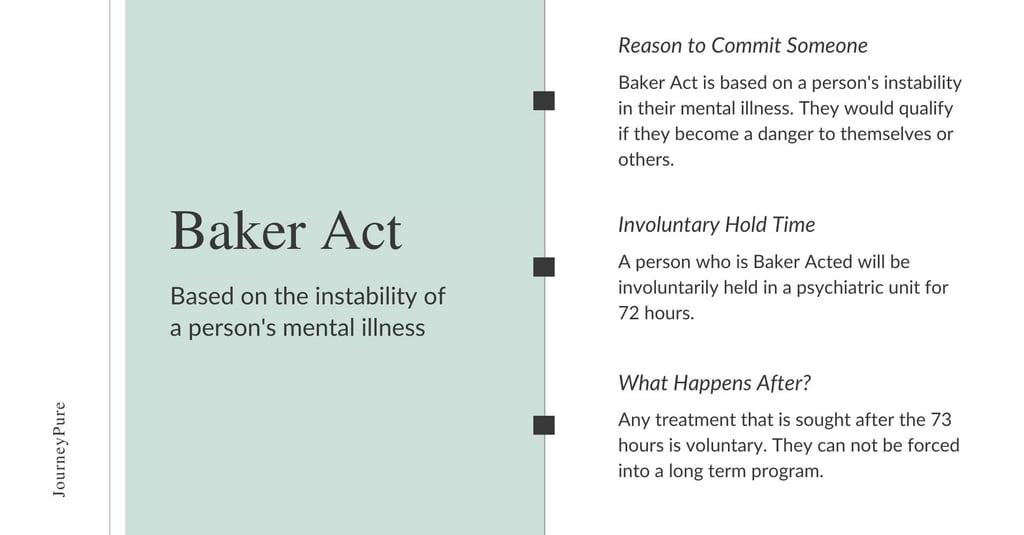Understanding the Baker Act: What It Is, What Happens, and What Comes Next
When someone is experiencing a mental health crisis and poses a risk to themselves or others, Florida law provides a protective measure called the Baker Act. This legal action allows for the temporary, involuntary assessment and stabilization of individuals with mental health issues, ensuring they receive the care and evaluation they need.
Jose Guanti
3/2/20252 min read


What is the Baker Act?
The Baker Act, officially known as the Florida Mental Health Act of 1971, is a legal process that allows for the involuntary examination of an individual who is considered a danger to themselves or others due to mental illness. This law is designed to provide emergency mental health services and temporary detention for evaluation and treatment.
Who Can Initiate a Baker Act?
Law Enforcement Officers – If they believe the person poses an immediate threat.
Physicians or Mental Health Professionals – If they determine there is a risk to the individual or others.
Judges – Can issue an ex parte order based on evidence or concern from family or community members.
What Happens During the Baker Act?
When someone is Baker Acted, they are transported to a mental health facility for evaluation. The law allows for an involuntary hold of up to 72 hours (3 days) for assessment and stabilization.
The Process Includes:
Initial Assessment:
Upon arrival, medical professionals conduct a mental health evaluation to determine the person’s psychological and physical state.
Stabilization and Care:
If the individual is a danger to themselves or others, they receive immediate care and monitoring. This may include medication and therapeutic interventions.
Observation Period:
During the 72-hour hold, professionals assess the individual's risk, mental health status, and the need for further treatment.
Family Notification:
Family members are often notified of the situation, unless the person is an adult and refuses consent.
What Happens After the Baker Act?
Once the 72-hour period ends, one of three things can happen:
Discharge:
If the person is no longer considered a threat and is stable, they may be discharged with a treatment plan and follow-up recommendations.
Voluntary Admission:
If the individual recognizes their need for help, they may choose to remain for continued treatment voluntarily.
Involuntary Commitment:
If professionals determine that the person remains a danger to themselves or others, they can petition the court for involuntary commitment, extending the stay for longer-term care.
What Rights Does the Individual Have?
Even during a Baker Act hold, the individual retains certain legal rights:
Right to Legal Representation: The individual can request a lawyer if a court hearing is required.
Right to Refuse Treatment (in some cases): Unless they are deemed incapable of making informed decisions.
Right to a Hearing: If involuntary commitment is pursued, the person has the right to contest it in court.
Right to Privacy: Confidentiality laws protect their medical records and personal information.
The Role of Families During the Baker Act
Families often play a crucial role during this process. While it can be an emotional and challenging time, understanding the intent and process of the Baker Act can help families navigate it with more confidence and compassion.
What Families Can Do:
Stay Informed: Understand the rights of your loved one and the steps involved.
Communicate with Medical Staff: Share relevant medical history or concerns that may aid in evaluation.
Prepare for Aftercare: Be ready to support ongoing treatment and recovery after discharge.
Understanding the Next Steps: After the Baker Act
Transitioning back to daily life after a Baker Act hold can be challenging. This is where aftercare planning is essential. It may include:
Outpatient Counseling and Therapy
Medication Management
Support Groups and Community Programs
Residential Treatment (if needed)
Need Guidance Navigating Mental Health Transitions?
Understanding the Baker Act and its implications is critical for the well-being of your loved one. If you need help finding the right care options or transitioning to a safe environment after a mental health crisis, I’m here to support you.
Call me today: 561.971.9142
I strongly advise seeking proper education and guidance from certified professionals to ensure that all decisions are informed and secure.
